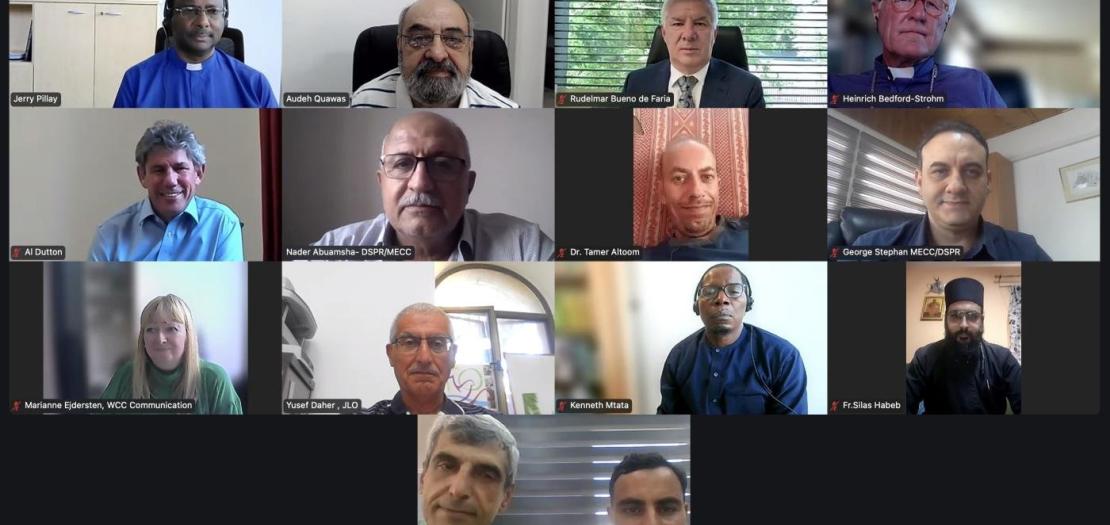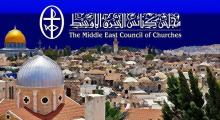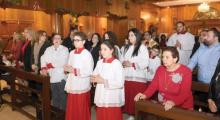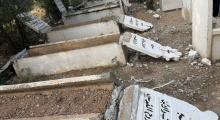Issued by the Catholic Center for Studies and Media - Jordan. Editor-in-chief Fr. Rif'at Bader - موقع أبونا abouna.org

The ongoing war in Gaza continues and the death toll is rising in light of the dangerous security escalation which the region is witnessing as a result of the conflicts that are worsening there. In this context, a delegation from the World Council of Churches (WCC) and Ecumenical partners, which is conducting a virtual solidarity visit to the Holy Land between 7 and 8 August 2024, was keen to listen to field stories from Gaza in order to convey the voices of those affected and in pain to all parts of the world and to renew the call for the necessity of working to achieve peace in the region.
In this context, an online meeting was held on Tuesday 7 August, bringing together the World Council of Churches (WCC), the Middle East Council of Churches (MECC), the ACT Alliance, and the Caritas Internationalis, with medical staff in Gaza who shared their testimonies and daily suffering and highlighted their urgent needs and future aspirations.
The delegation participating in the virtual visit, which extends between 7 and 8 August 2024, includes His Grace Bishop Dr. Heinrich Bedford-Strohm, WCC Moderator, Rev. Prof. Dr. Jerry Pillay, WCC General Secretary, Mr. Rudelmar Bueno de Faria, ACT Alliance General Secretary, and Mr. Alistair Dutton, Caritas Internationalis Secretary General, Dr. Audeh Quawas, Member of the WCC Central Committee and Executive Committee, Prof. Dr. Michel Abs, Secretary General of the Middle East Council of Churches (MECC), and Mr. Erik Lysén, ACT Alliance Moderator.
During the medical meeting, Father Silas Habeb, from Gaza’s Saint Porphyrius Church, thanked the delegation for listening to the experiences of people on the ground in Gaza. He said, "the support you are offering is enabling people to continue standing, and to feel differently, that people are still caring about us. Continue praying for us, and enable us to live with dignity in such a difficult situation.”
Noting that the needs in Gaza are vast, especially since more than more than 400,000 people suffer from chronic diseases and have been left without treatment. This is in addition to the serious injuries that people are exposed to as a result of the ongoing war, without forgetting the displacement of some medical workers, and the psychological suffering that many in the country are witnessing.
Hence, Health consultant Dr. Bassam Abu Hamad, one of the medical doctors who spoke about how they are caring for people, highlighted the work of mobile health units in Gaza, which are operated by the Middle East Council of Churches Department of Services to Palestinian Refugees (DSPR). He pointed out, "the war has no rules. There is no respect for human rights, and there is indiscriminate killing. But we are Palestinian, so we don’t ever give up."
He estimated that 70 percent of health facilities in Gaza have been demolished, and now most patient services are being provided via mobile clinics or by doctors who travel via donkey or on foot. He added “We need to reach the people who cannot reach us. The only certain thing in Gaza—is uncertainty.”
Deep Respect
In this context, His Grace Bishop Dr. Heinrich Bedford-Strohm, WCC Moderator, indicated that the discussion which took place at the meeting was very touching, expressing his deep respect for the work of doctors, and stressing the urgency of sharing their stories. He said, "I think people are beginning to understand the massiveness of the injustice. Religion needs action—and I promise you, we will continue to hear your voices. This was very important."
In his turn, Rev. Prof. Dr. Jerry Pillay, WCC General Secretary, expressed his deep appreciation for the presence of the doctors and other caregivers on the ground in Gaza. He pointed out, "the Christian witness is visible with the care and support you have been giving on the ground. I am pleased to know that you are doing medical support but also psycho-social services because one of the things that is worrying me immensely is the psychological damage and scars that are created."
For his part, Mr. Rudelmar Bueno de Faria, ACT Alliance General Secretary, expressed his deep distress about the worsening conditions the war has brought to those with medical needs and the doctors treating them. He said, “In our digital solidarity visit to the Holy Land, we met with medical doctors and residents of Gaza. We are deeply distressed by their hardships and stand in solidarity with them. We are particularly concerned with their limited access to essential medical services and medicines, the environmental degradation, and the emergence of new diseases. We urgently call for a ceasefire, humanitarian access, and justice for Gaza.”
Mr. Alistair Dutton, Caritas Internationalis Secretary General, said he was appalled at the complete disregard for human life. He added “the level of human suffering is incredible: people are on the point of starvation; there is no water, electricity, drainage or sewage; health care has collapsed with direct hits on hospitals and clinics, and the absence of even the most basic medical supplies. The border remains closed and people are actively deprived of the humanitarian assistance they so desperately need.”
Dr. Audeh Quawas, Member of the WCC Central Committee and Executive Committee, said that the doctors who are helping people stay standing—both physically and psychologically—in Gaza are heroes. He added: “We have been and will continue to support you. We can coordinate in the future even more between all the churches, and bring our Christian witness into Gaza.”
It is noteworthy that the Department of Service to Palestinian Refugee at the Middle East Council of Churches (MECC) continues its relief work in Gaza and in various regions in order to support the affected people at various levels and provide their health, psychological and moral support.







